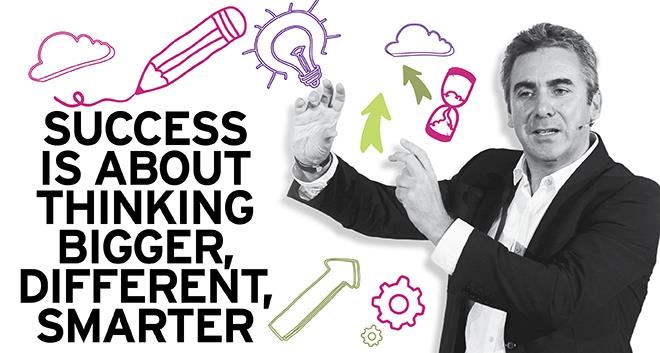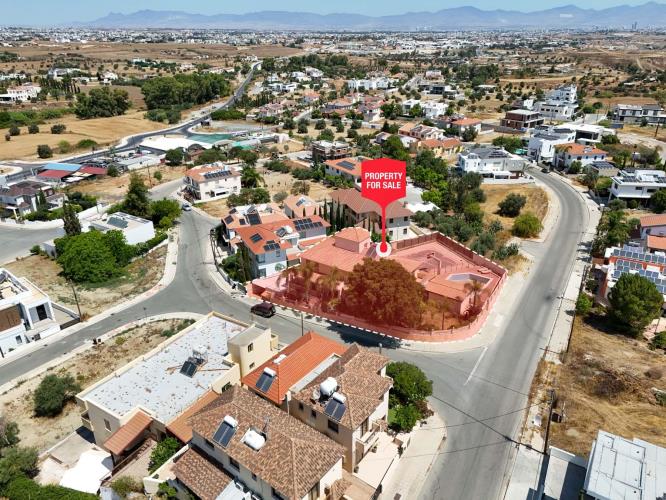By Marianna Nicolaou
Although he was trained as a nuclear physicist, Peter Fisk is today an internationally known marketer, author of eight books including “Gamechangers”, Founder of the specialist consulting firm GeniusWorks and Professor of Strategy, Innovation and Marketing at IE Business School. He has been featured on the Thinkers50 “Guru Radar” list as one of the world’s top business thinkers and experts and his name is associated with companies such as British Airways, Coca-Cola, Microsoft, Oriflame and Aeroflot. Peter Fisk spoke to InBusiness Magazine and shared his advice, experience and knowledge on Marketing and Business Strategy.
How does one move from nuclear physics, to managing brands such as British Airways, Virgin and Microsoft?
Peter Fisk: Science is about making sense of the world – based on experimentation that starts with a creative hypothesis, and then proving it through demonstration and analytical method. For me, being a physicist was interesting and a good training, but my passion was much more about people, creative ideas and innovative action.
Similarly in marketing we need “right-brain” thinking to imagine new possibilities, find new market opportunities and observe new behavioral patterns – and then “left-brain” thinking to analyse the big data, quantify the impact, and focus our effort. We need to do both more than ever. Marketers need both, more than ever, to make better choices in a big and connected world, and to “out-think” the competition.
For Cypriot marketers this is even more important. Success is not about how big you are, or even where in the world you are based. It is about thinking bigger, different and smarter.
How has technology changed strategies for business and brands? How has it made life easier for the promotion of a brand and at the same time, how has it made it more complicated or challenging?
PF: Technology has transformed markets, and how to win in them. Genetics, robotics, infomatics, nanotech – over the next 15 years we will see more change than in the last 300 years. It creates new markets, sectors converge, and geography becomes irrelevant. These new technologies change are lives (for example 23andMe’s DNA profiling for $99 transforms healthcare, and your personal future), and change the ways of doing business (for example, WhatsApp creating $19bn of value in 3 years with 17 people).
Marketing is also transformed by technology. Not only in terms of digital channels and interactive media, big data and personalization, but also in the fundamental ways in which people make choices and engage with brands. Marketing is about pull not push, doing business on customer terms – when, where and how they want. Businesses can engage directly with consumers (look at Amazon Dash), so retailers and distributors need to think differently. Consumers trust each other more than any brand, so loyalty is built in communities (like Harley Davidson).
For marketers this requires us to think differently. To seize the opportunities of technology, we need to think strategically – we could be in almost any market (product or geography), though new partnerships, sharing capabilities, and new business models. Through services and broader solutions, any brand can find new revenue streams, be they ancillary activities, or moving to a subscription service, for example. We shouldn’t just think of technology as digital channels, but as ways to reframe and reinvent our business. We also shouldn’t think of digital as something extra, it should just be the normal way of working, physically and virtually, for every business.
You have well known clients such as Coca Cola, P&G, Red Bull, Oriflame, British Airways, Aeroflot as well as purely technology-based ones like Microsoft. What are the similarities and differences from a marketing perspective when approaching different brands with different objectives?
PF: In market, we get obsessed by our own industry. We think we are so different. But consumers work across sectors every day without ever thinking about it. The best ideas don’t come from seeking to imitate your competitors (who are almost the same as you), but by taking ideas and insights from other markets, and then adapting them. For example, a bank learning from a retailer (where the consumer is the same person, and so you can already see what works and doesn’t!).
Marketers need to be better at learning from other markets. Retailers learning from travel brands, food learning cosmetics, healthcare learning from financial services, and on. Even in business to business, we are still talking about people. Indeed B2B is becoming less and less different from any other consumer or industrial sector. Data, social media, content and experiential marketing are just as important. People still ultimately make decisions in 2.8 seconds (according to neurologists).
What is interesting is how technology markets have led the way in being more collaborative – open innovation, platform strategies, co-creation and ongoing collaboration. Companies like ARM, the world’s leading semiconductor business, have become 10 times more successful than Intel, for example, through the power of ecosystems, working in partnership with customers, fast and agile.
How would you describe and assess the Marketing sector in Cyprus?
PF: I want to learn more about the Cyprus market and local brands. Local people are the experts of the market, I can bring new ideas and examples to inspire them to think and act differently!
As I said, being a small country, is no longer a disadvantage. You are not limited by your geographical size, both in taking local brands to global markets, or in being focused and relevant locally.
Two examples I do see which seem to illustrate the changing Cypriot brand landscape are the rise of Cobalt (new investors, new business model), and also Invest.com (new proposition, global market) – alongside the decline of traditional models and companies.
In January 2015, for example, Cyprus Airways flight 337 from Athens touched down at Larnaca airport – the final landing for an airline established 68 years ago. In June 2016, a new Cypriot airline launched, Cobalt with 49% Chinese state investment. Like AirAsia and JetBlue, it combines the value for money pricing of low-cost airlines with high tech interiors and modern service. Meanwhile the best funded start-up in Cyprus is Invest.com is seeking to “democratise smart investment”. Ophir Gertner, the founder, says it offers “smart investing opportunities for everyone, including portfolio management, access to a range of alternative investment strategies and trading platforms”.
As a global thought leader, expert consultant and keynote speaker in marketing, what would you advise a marketer nowadays regarding the promotion of a brand?
PF: Times of change are the most exciting times. Every market is changing faster and more dramatically than ever – everything from banking to newspapers, winemaking to healthcare. Change is disruptive, but also exciting, because it brings new opportunities.
Now is the most important and exciting time to be a marketer. Marketers are the people in business who can make sense of changing markets, they navigate the future trends and opportunities, and guided by changing customer attitudes and behaviours. Technology is just an enabler in all of this. For Cypriot marketers, you have more opportunity than ever before, global markets and local advantages. You just need to think. Think bigger, think different, think smarter.
Now is the time to be a gamechanger. To think how you can change “the game”, the way your market works, and the way your brand can win. Marketing is not simply about promotion – of the same old products, through the same old channels. You can do better than that. Be the Nespresso coffee of your market (great and profitable). The Dollar Shave Club (cheap and cheeky). Or the Tesla car (direct and connected). Whatever your business, size or sector, you can change.
Come along to Gamechangers Cyprus on 30 September and I will tell you how!
Peter Fisk will be the keynote speaker at the 3rd Brand Congress, presented by Cyta, which will take place at the European University Cyprus in Nicosia, on September 30. The theme of this year’s brand congress is “Gamechangers Cyprus: Innovative strategies for business and brands in a fast changing world”.
For further information about the Congress click here. http://www.imhbusiness.com/3rd-brand-congress#pdf-programme
To register online please click here http://www.imhbusiness.com/3rd-brand-congress#register
















